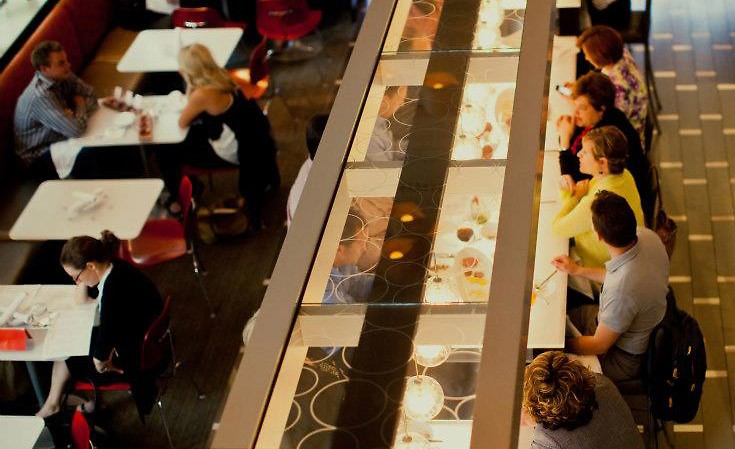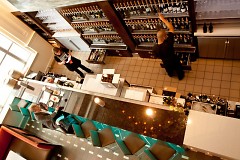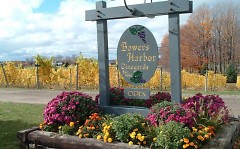The Tasting
Offering some of their best red and white wines, Bowers Harbor Vineyards, a local family-run boutique winery on Old Mission Peninsula in Traverse City, held a wine tasting at Reserve Wine & Food, a local downtown restaurant. Reserve, which serves some of Bowers’ wines, promotes local food and wine through its seasonal menu, which can change up to twice per week. The event showcased Bowers' multiple-award-winning red wine ‘2896’ and their varietal white wine, Block II Riesling.
The event was held upstairs at Reserve. The restaurant boasts a glasspour list of over 100 wines, currently including Bowers' '2896', Block II Riesling and also their Wooded Chardonnay. Reserve has only recently begun holding tasting events. Brandon Joldersma, assistant general manager at Reserve, felt that the Bowers tasting event was their most successful one. He believes this is likely due to the increased interest in Michigan wine.
When Bowers Harbor Vineyards asked the group of participants at the Reserve event which wine they favored most, the majority said the 1996 vintage of ‘2896’, a red blend Meritage wine which Justin Leshinsky, Bowers’ director of sales, described as “our pride and joy red.” The name for ‘2896’ comes from their address at their vineyard. The wine comes out of Bowers’ Langley vineyard, named after the Harold Langley, grandfather of Spencer Stegenga, co-owner of Bowers.
The second wine presented was Bowers’ Block II Riesling. Being a varietal, Block II Riesling was made from a single grape variety, Riesling. The name Block II comes from the block of horse pasture which is now their Block II vineyard. Bowers’ Riesling vines, which are imported clones of their high quality German counterparts, are coming to their 21st year of growth. This is one of the reasons Bowers wanted to showcase this wine for the tasting. In the wine world, Michigan is known for its Riesling, which grows well in this area.
Bowers benefits from some of the best “terroir,” in the world, said Leshinsky. This, the French term for “what the earth gives back to vineyard,” he explained, allows our nutrient-rich soil to have an “earthy feel to it that really accentuates the flavor of the wine.” Michigan also enjoys the best growing region on earth since it lies on one of the 45th parallels, along with France and Italy. Here growing seasons are a good four to five months. This richness in soil is particularly true of vineyards such as Bowers situated nearby Bowers Harbor on West Bay.
Reserve: Wine & Food
Joldersma believes buzzwords like “local,” “organic,” and “seasonal” have lost their meaning in the world of marketing today.
In contrast, the idea behind them is something that Reserve takes “very very seriously. We print our menus in-house because if something goes out of season and we’re not able to get it from producers around here it comes off the menu immediately. Something else comes into season and new items go on the menu. The chef is not always satisfied. He doesn’t create a menu and go ‘oh this is perfect. I’m not going to change it for four months,’” Joldersma said. “He’s (The chef's) always looking to make things better, and improve and change.”
The restaurant is co-owned by Dick and Betsy DeVos and Kameel Chamelly, who also owns Martha’s Vineyard, a local wine and liquor store with a global wine selection. Reserve, which opened the first day of ArPrize 2010, also houses the first ArtPrize winner, “Open Water No. 24”, purchased by Dick Devos, whose son Rick Devos founded ArtPrize.
Reserve was envisioned by The DeVos family through its extensive travel on business. They saw an opportunity to share with Grand Rapids some of their wine and food experiences through a unique wine selection and through the interior design of Reserve.
Joldersma said Betsy DeVos “was instrumental in the process of choosing the way the place looked.” Formerly a bank, “It’s both modern in some respects and it also retains the integrity of the building . . . it still has a lot of the marble molding around the sides -- a lot of the original detailing.”
Reserve offers unique wines that are not found anywhere else, made possible through its cruvinet system, a dispensing tool that allows wines to be preserved for future pourings so that expensive wines can be served economically with less waste.
Winemakers are saying that 2011 was an exceptional growing year because of the extensive warmth for ripening the grapes. Michigan can be proud of its great soil, and celebrations such as Bowers’ wine tasting are an appropriate way to celebrate both the land and especially last years’ bounty from it.
The Rapidian, a program of the 501(c)3 nonprofit Community Media Center, relies on the community’s support to help cover the cost of training reporters and publishing content.
We need your help.
If each of our readers and content creators who values this community platform help support its creation and maintenance, The Rapidian can continue to educate and facilitate a conversation around issues for years to come.
Please support The Rapidian and make a contribution today.



